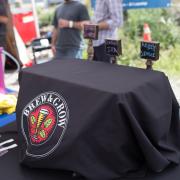Dear Chaos.
I keep making bad pilsner. I could use some help.
I'm following all of the basic rules. Using 2 packs of saffale 34/70 and fermenting in the ferm fridge for 2 weeks. Letting it sit for 4-6 weeks in the lagering fridge with a 2 day diacetyl rest in between.
My recipies are really straight forward:
half oz of magnum at 30 min
1 oz of hallertau at 15 min
1 or 2 oz hallertau at flame out
This should make a really standard pilsner... but what I get is:
-Watered down tasting (using 4-5 lb of DME)
-Lacking hop flavor and aroma. This is main problem. When I make this same recipe with my trick using s-05, I get a really drinkable cream ale. But in lager form it's got all the character stripped away. I end up dry hopping in the keg with 2 oz of hallertaur for a day or two just to get some flavor into the beer.
-Off flavors. I can't seem to get this to be really "clean". My last batch had a distinct "sour apple" to it, which might fade with another week or two in the fridge... but still. This should be really consistant.
Would love any advice or help. I'd like to get a nailed down lager recipe in the next month or two so I can make something great for Oktoberfest.










Kris, can you bring a sample to the club meeting this weekend? That would be the easiest way to diagnose any issues you may be having. That being said, I can make an educated guess at some of the issues you are having right now:
1) Let's assume you are making a 5.5 gallon batch with 5 pounds of DME. That's going to give you an OG of very roughly 1.038. With a perfect fermentation, you're only netting out about 3.7% alcohol, with no other specialty grains to add flavor. For reference, the super watery Coors Light clocks in at 4.2% alcohol, the "piss water" budweiser clocks in at 5%, and the full-flavored Icehouse comes in at 5.5%. Do you mind posting your OG and FG numbers here? The point is, lager yeast and lager grain bills will create a different flavor profile than your recipe using SO-5. Know your ingredients.
2) Most standard pilsners aren't all that hoppy to begin with, but keep in mind that when you are using SO-5, you are not conditioning the beer for 2 months in a cooler, and SO-5, as opposed to lager yeast, is not terribly flocculant. Hops flavor will degrade over tim, especially if they aren't under pressure. How exactly are you cold conditioning your pilisner? Is it under pressure? If you are really lacking the authentic "hop flavor" and it really bothers you , next time try bombing in 3 ounces of Mt Hood at 60 minutes and see what happens.
3) It's acetaldehyde. Cause by either i) incomplete fermentation, or ii) exposure to oxygen. The good news is that in either case, if you are pitching healthy yeast cultures cleanup should just be a matter of time. If you were to ask my number guess, I would say it might have to do with your water profile. You use packaged ice to crash your temperature, right? Packaged ice may be sterile, but it may be important to note what sort of minterals are exactly in that ice. What is the water profile of your packaged ice? Do you treat your water? I don't actually know how DME is made or what it is made from, so does anyone want to chime in on what sort of mineral profile the DME itself retains from the manufacturing process?
DME is basically freeze dried wort. I think one of your issues is the DME itself and not using actual grain. Since lager yeasts ferment super clean, a big part of lager flavors come from the grain. This is admittedly not very scientific, but I don't think DME will give you the correct flavors and that's more apparent with clean fermenting lager yeast, as opposed to brewing with ale yeast that will provide esters and phenols for flavor.
I agree with Boolish, that sour apple is more than likely acetaldehyde. If you aren't having much luck with the dry yeast fermenting well, try making a starter with a strain from Wyeast or White Labs.
Your hop flavor may be okay, don't expect an IPA or even an APA level of hop character in a pilsner.
Are you using tap water? A pilsner needs water that's much softer than what comes out of the Chicago tap. Last pilsner I made was cut with 80% distilled water (don't get spring water, that has minerals in it).
http://tinfoilhatbrewery.com/
Matt, you would be surprised at how good the Chicago water is for brewing the pilsner style. The only barrier that's really concerning is the bicarbaonate level messing with the ph (and, if he's cutting it with distilled water/ice made from distilled water, you might have problems with calcium counts).
The water in Chicago, aside from the alkalinity, is quite good. I made an adjunct light lager with an absurd amount of corn in it a few months back with just acid adjustments.
Jeff may have a point about DME before. While I've personally never heard a reputable source complain about its ability to make a high quality wort, it is definitely possible to lose out on a lot of the grain/straw flavor that the grain itself imparts to the beer. Although if acetaldehyde is the problem, then it's probably not the extract that's causing it. Extracts should be manufactured with enough proteins and lipids to keep yeast healthy.
Nobody particularly wants to think of it as a possibility, but over-pitching could also be an issue. Two dry packs of healthy, laboratory packaged yeast into a tiny beer may cause problems with finishing fermentation (the stage where the acetaldehyde gets cleaned up).
From the Yeast book:
"If the beer is overpitched, yeast do not grow though a complete growth cycle. This results in few new yeast cells, which makes for unhealthy yeast and low viability by the end of fermentation."
I cannot personally attest to how much of this is accurate for homebrewers vs Chris White's analysis of lab samples, but it seems like it makes enough sense that it shouldn't be dismissed outright.
I actually think of a Pils (German that is, which is what it seems you're going for) to be a moderately hoppy (and medium to highly bitter) beer. I wouldn't soften the water either - it traditionally has water higher in sulphates to accentuate bitterness and dryness in the finish. But yeah, the first thing I would want to see is the full recipe since, as James points out, 4-5 lbs DME is going to be a rather lower gravity beer if I'm assuming 5-5.5 gallons end boil volume correctly.
Fermentables
Weight (lbs)
Grain
Gravity Points
Color
Hops
Weight (oz)
Hop
Form
AA%
AAU
Boil Time
Utilization
IBU
So the above is a fair description of my recipe. I've noticed the acehaladye flavor is still diminishing. So maybe 6 weeks will clean it out, not 4. I've also had luck with boehmian lager yeast before, so I'm doing that again now (have another lager going, but I whirlpooled with 2-3 oz of hallertau to deal with the lack of hops flavor in it, so maybe not the best experiment). To trouble shoot this, can I get some advice/review on these two below test recipies?:
Recipe 1: trouble shoot hops amounts, yeast, and water.
First, I should say that I have done this with 1/2 distilled water before and I can't really notice a difference. I'll make sure to do that for both test recipies.
So recipe one will be the same as the original recipe, except I'm going to bump up the amount of hops. I'll do .75 magnum at 30; 1 oz hallertau at 18, 1 oz at 5, and 1 oz at flameout/whirlpool. That should give me some stronger flavor without overwhelming it. I will also only use one yeast pack as this is a 1.045 lager.
Recipe 2: Troubleshoot DME and gravity
I'm going to do a 100% pilsnermalt (maybe 2 oz carafoam) and bump the gravity up to 1.055. I'll most likely use the same hopping schedule as Test Recipie #1 since I"ll need more hops to balance out the higher gravity. I'll follow the original recipie otherwise, including 2 packs of yeast.
These two test recipes will give me a pretty good "spread" of knowldedge about what's going on. Anyone have any other suggestions how I could do 2 test batches? I'm getting a little tired of making failed pilsners, so I've got enough in me to do 2 test batches before I give up for awhile.
Thanks guys!
holler at me at the meeting sunday, we'll get you sorted out.